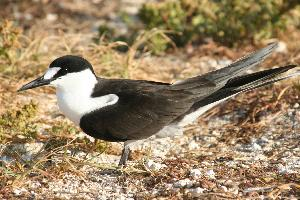
State of endangerment
| Endangered |
Animal description
The Sooty Tern (Onychoprion fuscatus) is a captivating seabird known for its distinctive appearance and far-ranging flights across the tropical oceans. This medium-sized tern, with a length of approximately 33 to 36 cm and a wingspan of about 82 to 94 cm, is distinguished by its sleek, streamlined body that is superbly adapted for life at sea. The adult Sooty Tern sports a striking contrast in coloration, with a black cap and back that seamlessly blend into its white undersides, creating a sharp demarcation that is easily recognizable. The bird's wings are long and pointed, enhancing its ability to glide effortlessly over the ocean for hours in search of food.One of the most remarkable features of the Sooty Tern is its deeply forked tail, which adds to its agile and graceful flight dynamics. The bird's beak and legs are black, contributing to its overall sooty appearance, from which its common name is derived. The beak is sharp and well-suited for its diet, which primarily consists of small fish, squid, and crustaceans plucked from the surface of the water or caught in mid-air during its low, swift flights.
Sooty Terns are highly social birds, often found in large, noisy colonies on isolated islands throughout the tropical oceans. They are renowned for their loud, piercing calls, which can be heard over long distances, serving as a means of communication among individuals within the dense colonies. Breeding season brings an incredible spectacle as thousands of these birds congregate to nest, laying their eggs directly on the ground or on bare rock without the construction of a traditional nest. This behavior exposes their eggs and chicks to potential threats, but the sheer number of breeding terns acts as a deterrent to predators.
The life cycle of the Sooty Tern is fascinating, with chicks exhibiting a unique speckled camouflage pattern that helps them blend into the surrounding environment, offering protection from predators. Adults are highly attentive and will vigorously defend their offspring from threats. Remarkably, Sooty Terns are known for their long-distance migratory behavior, with some populations traveling thousands of kilometers between breeding sites and feeding grounds. This extensive travel showcases their incredible stamina and adaptability to various marine environments.
Sooty Terns play a crucial role in their ecosystem, acting as indicators of ocean health and the abundance of fish populations. They are also of interest to scientists and conservationists who study their migration patterns and breeding behaviors to understand the impacts of climate change and human activities on marine life.
Despite facing threats such as habitat loss, predation by introduced species on breeding islands, and human disturbances, the Sooty Tern remains widespread and numerous. However, ongoing conservation efforts are essential to ensure that this remarkable bird continues to grace our oceans with its presence. Through protective measures and habitat conservation, we can help safeguard the future of the Sooty Tern, a true marvel of the avian world.
Similar Animals
New photos of animals
Top 10 animals
- Dolphin gull (Leucophaeus scoresbii)
- Diana monkey (Cercopithecus diana)
- Moustached guenon (Cercopithecus cephus)
- Galápagos tortoise (Geochelone nigra complex)
- Japanese macaque (Macaca fuscata)
- Stone loach (Barbatula barbatula)
- Greek tortoise (Testudo graeca)
- Russian tortoise (Testudo horsfieldii)
- Common flying dragon (Draco volans)
- Galápagos penguin (Spheniscus mendiculus)


